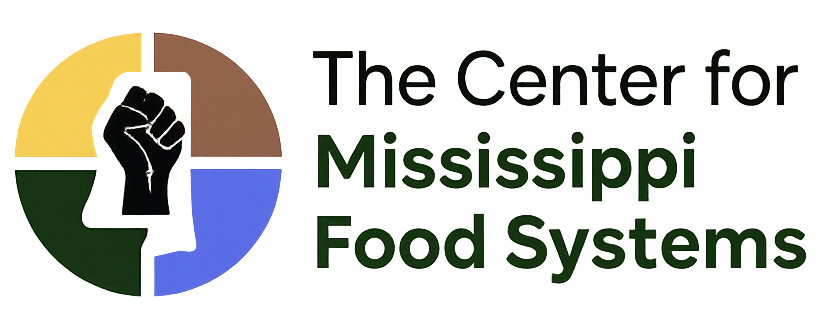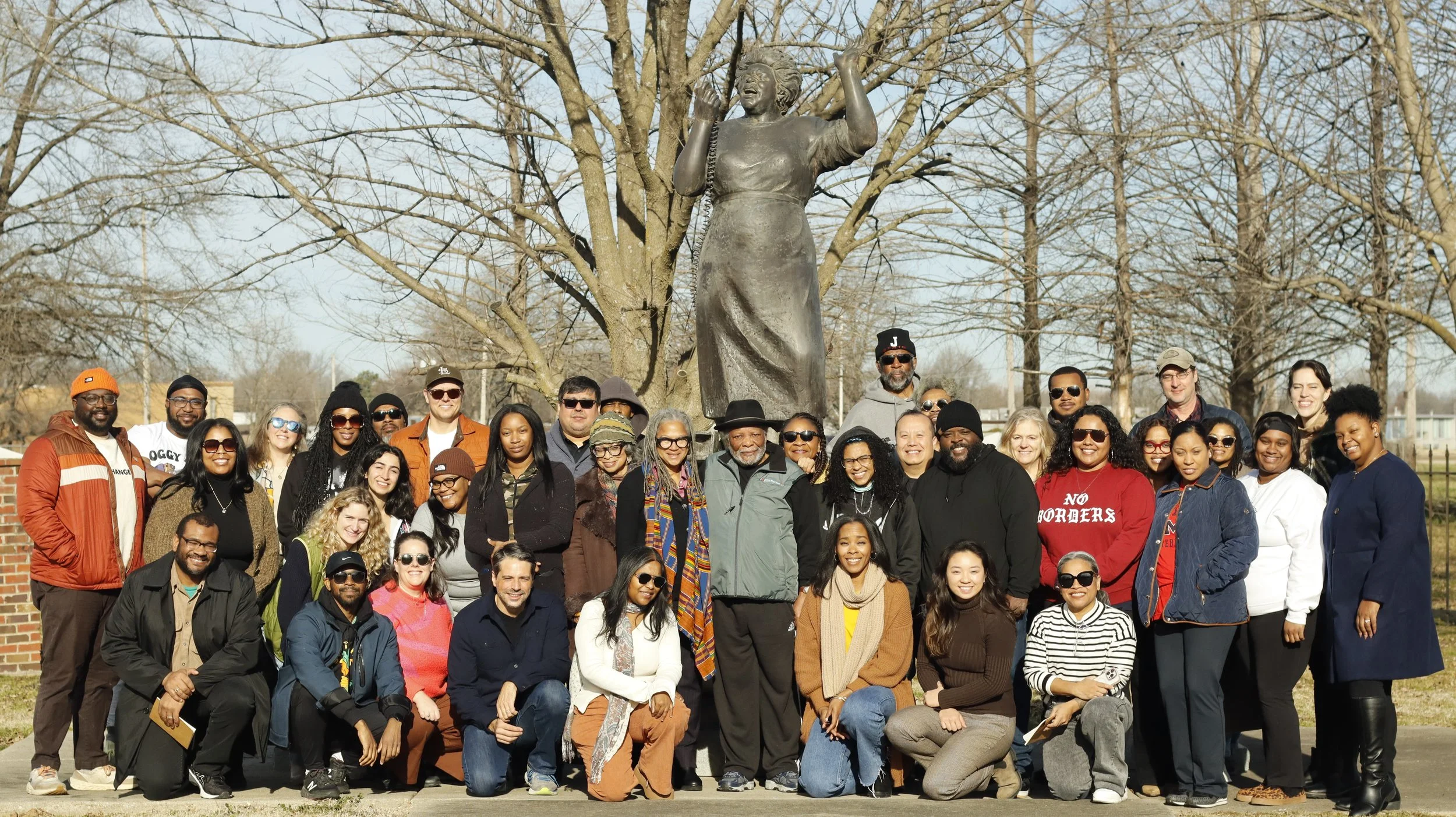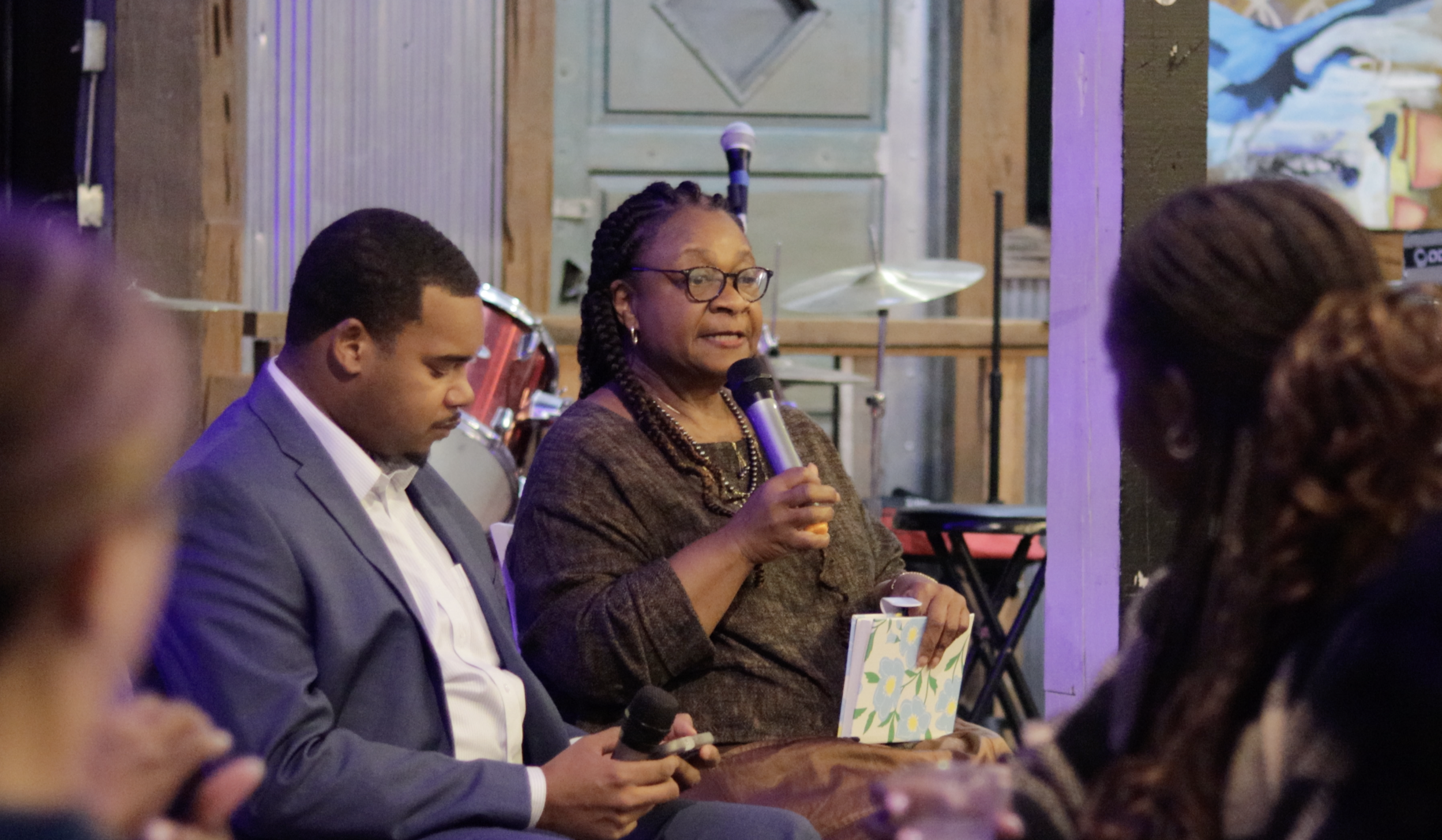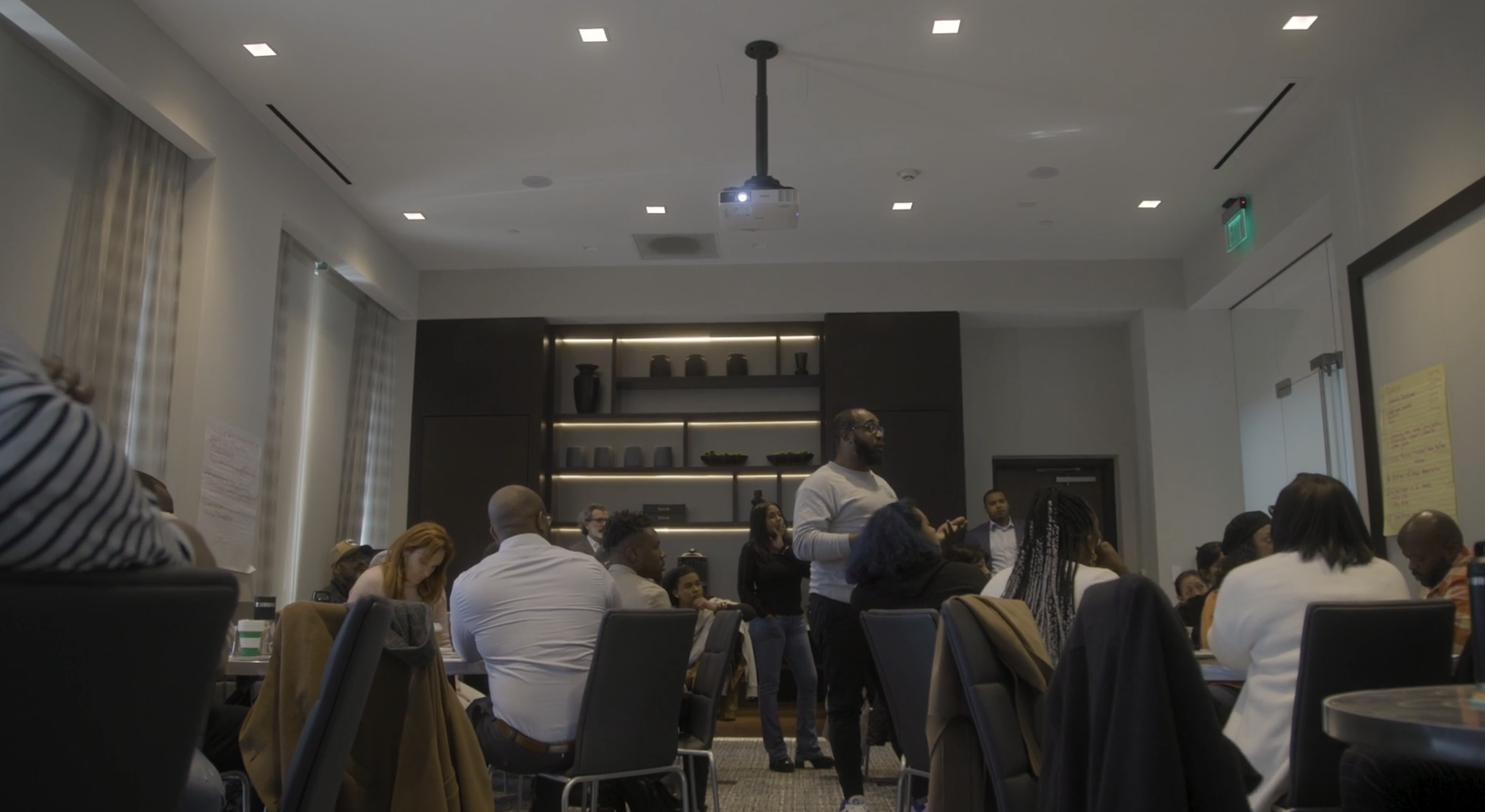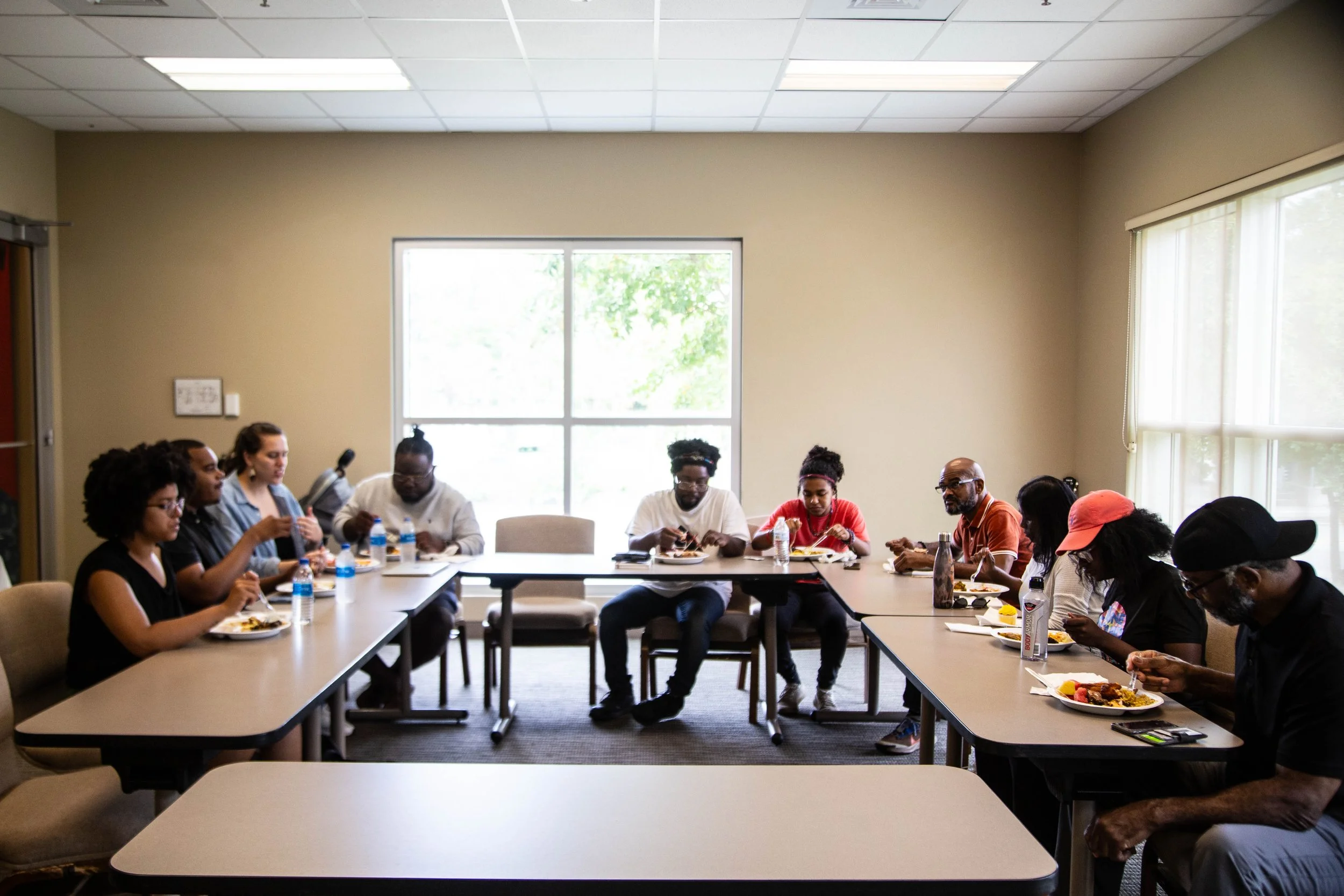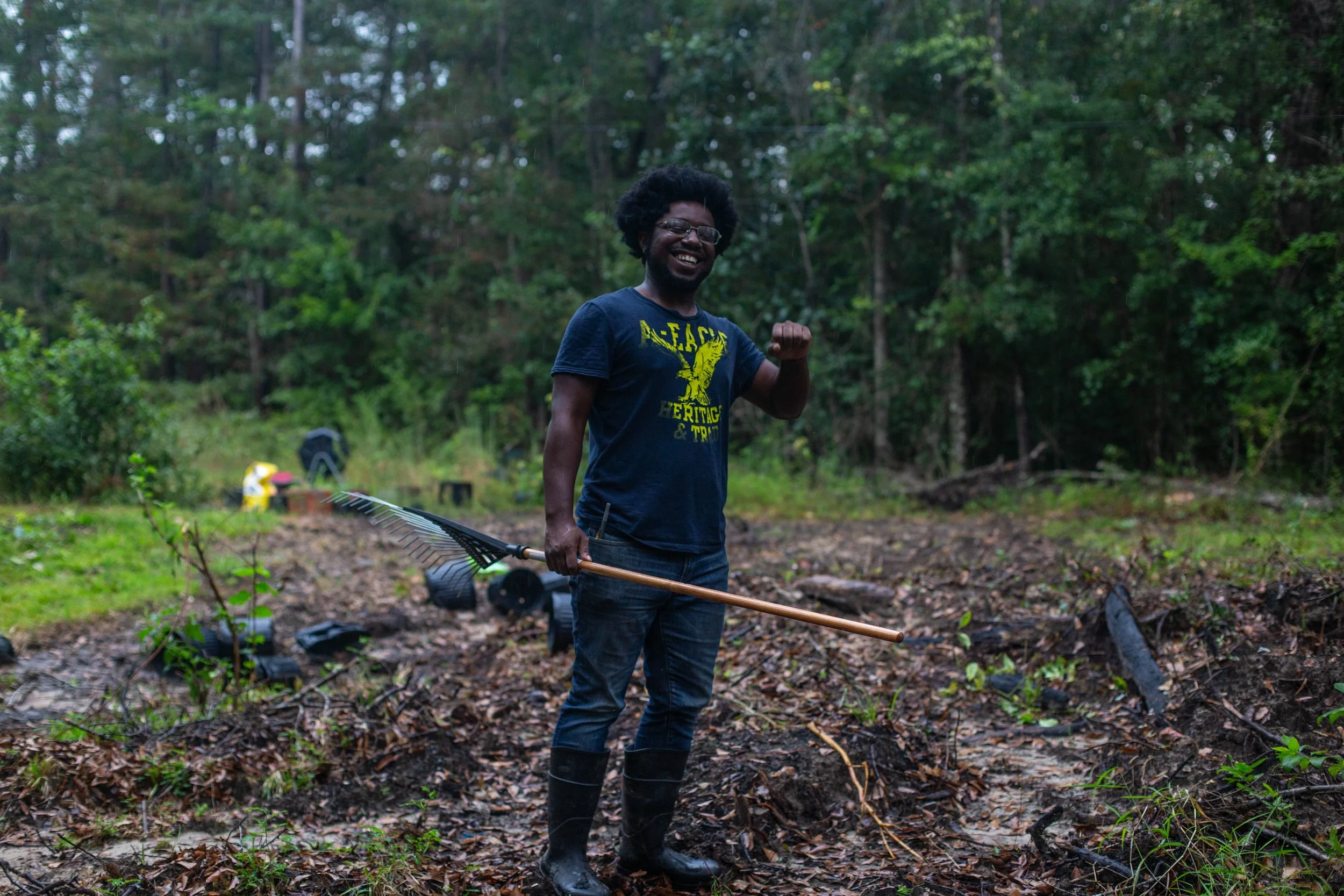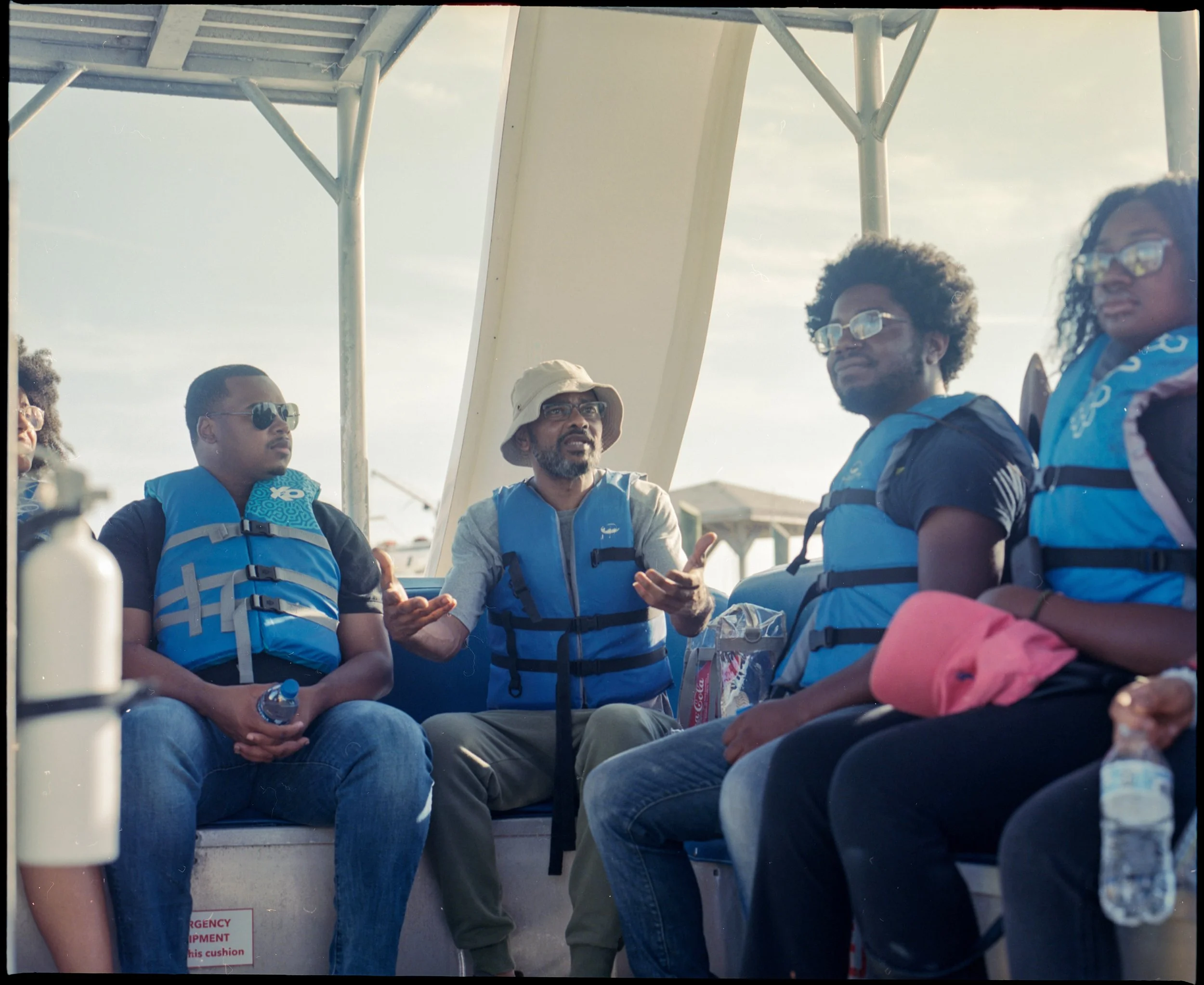We believe that food has the power to inform personal to systemic change.
Our work is rooted in values of Racial Equity, Economic Justice, Environmental Justice, Climate Justice, Labor Rights, Healthy Communities, Ethical Leadership and Food Sovereignty. We believe that Mississippi’s food systems and regional economies can be transformed through long term investments made in individuals, institutions and infrastructure. We are clear that Relationships, Culture, Structure, Policy & Story are the fundamental priority areas of our change work.
Our Story
A Shared Vision for Food Justice & Food Sovereignty in Mississippi
In 2016, a multiracial group of food system leaders—Black, Indigenous, Asian American, and allies—gathered for the first time to ask a powerful question: What if we could re-imagine Mississippi’s food systems together?
That gathering sparked the creation of the Mississippi Food Justice Collaborative. With support from the W.K. Kellogg Foundation and NCAT Gulf States, the Collaborative began working across four regions—Central Mississippi, the Delta, the Gulf Coast, and the Mississippi Band of Choctaw Indians—toward a future where food systems reflect health, equity, and community control.
Today, that vision lives on through the work of our fellows, our programs, and the powerful network of people building toward food justice and food sovereignty.
Our People
The Mississippi Food Systems Fellowship: Nurturing Systems Thinkers
The Mississippi Food Systems Fellowship is the first of its kind, unique opportunity created by Mississippians for Mississippians to grow a cadre of place based leaders, thinkers and doers, who care deeply about Mississippi and Mississippians. The fellowship was launched in 2020 as a strategic investment to build capacity of BIPOC leaders working to determine the future of food in their communities. Over the past five years, we’ve skilled up 22 fellows with direct funding, community connectedness, and leadership development.
Our fellows are across generations, genders, cultures, classes and represent Delta, Coastal, Choctaw and Central Mississippi regions.
How We Work Together
Our Core Initiatives
Our work moves through three interconnected initiatives, each addressing a unique need that was identified by Mississippi farmers, fisherfolk, producers and public health allies as critical to transforming our food systems infrastructure that is cultural, social, economic, environmental and political.
Mississippi Food Systems Fellowship & Leadership
Developing cadres of ethical, BIPOC food systems leaders grounded in community care, historical truths, imagining and determining food futures, and normalizing justice.
Mississippi Food Policy Council
Building values informed capacity of advocates, farmers, educators, and policymakers to shift statewide food policy and advocate for lasting change through the development of a Mississippi Food Plan.
Mississippi Food Justice Collaborative
A woven network of grassroots organizations and regional partners imagining, strategizing, and making equitable, just and sustainable food futures possible through values centered collaborations.
Our Values
-
“Every human is an expert of their condition and can reach their full potential when given access to the necessary tools. Economic justice is creating systems that remove barriers and providing every human with the opportunity to easily access the tools that they need to live a dignified, productive, creative, and harmonious life. In my community, this looks like guaranteeing a quality education for every child no matter their zip code, ensuring every person can provide for their family through work that they find meaningful, and making fresh food and preventative health care within reach of all Mississippians.“
— Alex Lawson, Corporate Project Manager, Hope Enterprise Corporation“Economic justice is the ongoing work of the civil rights movement in this country“
— Bill Bynum, founder of Hope Enterprise Corporation -
“Racial equity invites us to consider how being a person of color shapes their sense of agency and quality of life. Racial equity is the quality of fairness in systems that determine treatment, access, opportunities, and advancement of individuals or groups regardless of their racial identity or affiliation. Racial equity is achieved when ‘race is no longer a determinant of socioeconomic outcomes and life opportunities’ (Race Forward). This is an understanding of racial equity based on shifting more power to people of color (rather than simply including them) and that focuses on changes to decision-making, leadership and operational organization.“
— Tamara Jones, Dara Cooper, Simran Noor, Alsie Parks. “Racial Equity Implementation guide for food hubs.” June 2018. -
“Food sovereignty is the right of peoples to healthy and culturally appropriate food produced through ecologically sound and sustainable methods, and their right to define their own food and agriculture systems. It puts the aspirations and needs of those who produce, distribute and consume food at the heart of food systems and policies rather than the demands of markets and corporations.”
— La Via Campesina in Declaration of Nyéléni, the first global forum on food sovereignty, Mali, 2007“We must feed people for hunger is the enemy. Land is good and food feeds people…the condition is crucial. If we have that land can’t nobody starve us out.“
— Fannie Lou Hamer -
“The health and well-being of communities depend not so much on health care, but on the social, physical, and economic environment that we live, work, learn, and play in… Saying zip codes affect our health without talking about racism is simply no longer acceptable, in my view. If we hope to address the root causes of un-wellness, disease, and suffering in our communities, we have to be willing and able to tackle the systems and values that have created and continue to perpetuate the growing health inequities among racial and ethnic groups.“
— Alcalde, M. Gabriela. “Zip codes don’t kill people; racism does.” Health Affairs. -
“My grandfather, Otis Tisdale, always used to tell me: If you take care of this land, it’ll take care of you. “ - Ben Burkett
-
“I have always thought that what is needed is the development of people who are interested not in being leaders as much as in developing leadership in others.“
— Ella Baker“We are combating the apathy and hopelessness of the people. People are looking for immediate impacts, and, when the impact isn’t fast enough, they lose hope. Their minds are stuck in the short-term and they don’t look at the long-term… We need to train leaders who know what it takes to make long-lasting change and bring people together around issues.“
— Calvin Head, Mileston Coop -
"When the man who feeds the world by toiling in the fields is himself deprived of the basic rights of feeding, sheltering and caring for his own family, the whole community of man is sick" -Cesar Chavez
“Every single day we sit down to eat, breakfast, lunch and dinner, and at our table we have food that was planted, picked or harvested by a farm worker. Why is that the people who do the most sacred work in our nation are the most oppressed, the most exploited?” -Dolores Huerta
-
A Framework of Loving Accountability
Our Approach
We believe systems change happens when individuals, institutions, and infrastructure are abundantly invested in across a long period of time. Our approach is shaped by the wisdom and work of our people across generations and geographies. We have developed a culturally rooted analysis of power that supports how we steward change in the continuum of life across time and space, from our ancestors to the present generations to our ancestors of tomorrow.
Individuals
-
Over the last 9 years, we have grown into an ecosystem of over 75 individuals, including farmers, teachers, students, chefs, policymakers, academics, artists, and community leaders, who deeply care about change. Individuals such as Felicia Bell, Rock Woods, Liz Broussard, Sunny Baker, Ya-Sin Shabazz, Jason Grisham, Noel Didla, Asha Tillman, Alex Lawson, and Jed Oppenheim came together to do a needs analysis through honest conversations and recognized that in order to do statewide change work, we deserved to have a foundation of beliefs that resonate and inform our purpose. We also understood that we have to create the cultural infrastructure to build the leaders we deserve. Relationships and cultural work are core to how we build the power of our inner core as individuals. Therefore, we articulated our set of 1) beliefs, values and principles 2) We created the fellowship process 3) We practiced being iterative, emergent and responsive as everything we chose to do was informed by the work done by those that came before us such as Fannie Lou Hamer, L C Dorsey etc, the continued work of Ben Burkett, Darnella Winston, Calvin Head, Jane Nguyen, Cindy Ayers and the future work we can empower and enable. As a result of our practices, we invested in the fellows across a span of five years and 4 regions. We built trust with one another, with policy makers, communities, funders, cultural workers, academics, young people and folk who are food systems doers from other parts of the country and the world.
-
This level of building trust, building values-informed relationships, and practicing right relationships through political education, gifting books, book talks, immersive civil and human rights tours, museum visits, farm-to-table meals, drumming, wellness practices, conflict transformation practices, co-stewards journaling, retreats, gatherings, art exhibits, dancing, small group conversations, large group conversations, theatrical productions, documentary film making, skilling up sessions matter because we deserve to be informed, grounded and clear in our commitments to transforming food systems and building food futures. We need ethical leaders that are rooted in communities and the fellowship and relational work nurtures the development of a pipeline of multigenerational leaders who determine responsible regional economic transformation.
-
We’ve learned that
Relationships are complicated and take time and we must be patient, kind and caring
Trust is very hard to build, easy to break and needs practice
Change work is immediate, short term and long term. Each of us are skilled uniquely to be present in change work. It’s important to realize which part of the spectrum our skillsets are a natural fit to, and where we can support others as our work is collective and collaborative.
Investments of trust, resourcing and skilling up have to be made abundantly in individuals over the long term, knowing we are all vulnerable, at different growth points and unique in our life’s experiences. Its vital to see change as long term to build alignment around mission and vision.
We must know that we are humans who navigate contradictions, brilliance, vulnerabilities, strengths and weaknesses in our leadership, and build our capacity to forgive, course correct and care for each other through experiments, failures, contradictions.
Joy, healing, repair, cultural centeredness matters and decolonizing from corporate/capitalistic practices that dehumanize us and imagining and nurturing each other through story circles, respectful confrontation, eating other, check ins are fundamentally necessary.
Transparency, making space for discomfort, transitions, difficult periods of struggle must be values informed and principled.
-
Taking our learning to engage in a transition of 18 months to deeply reflect, reimagine, reevaluate and rebuild is what we are at now and into the next few months.
Our commitment is to build a 10-year strategic plan and a 200-year visualization (that’s fragmented into 10 year segments of deliverables) that will help institutions become healthy and have the collective power to transform food systems and regional economies.
Institutions
-
The center for Mississippi Food Systems is a hub that includes the Food Systems Fellowship, The MS Food Justice Collaborative of 12 state/regional partners, advisors and accountability partners. The collaborative partners are, Mileston Cooperative, Delta Fresh Foods Initiative, Boast People SOS, Hijra House, Gulf Coast Sustainable Growers Alliance, Piney Woods School, Mississippi Food Policy Council, Mississippi Farm to School Network, Choctaw Fresh Produce, NCAT Gulf States, Clarksdale Cultural Capital, Delta Commons Group, Food Corps MS.
Our advisors and accountability partners are Sade Anderson, Curtis Ogden, Kim Dixon, Jerrilyn Stokes, Karen Spiller, Jocelyn Poe, Mary Coleman, Anne Palmer, Chhaya Chhoum, Pheng Thao, Lance Wheeler, Alsie Parks and Karen Basserab, Ryan Betz, Sophie Hathaway, Delana Tavakol, Sydney Turnipseed, Ya-sin Shabazz, Felicia Bell, Rock Woods, Sunny Baker, Savi Horne, Alison Cohen, Dorothy Scarborough and Sarah Medlock.
Our cultural partners include Mark Henderson, MADDRAMA, Frank Figgers, John Spann, Leonette Henderson, Sade Meeks, Cindy Ayers, Enrika Williams, Glenda Barner, Phillip Brown, Yoseph Ali, James Kithuka, Wendy Brown, Jahi Brown Chappell, Danny Brown.
Our regional, national and global institutional partners are National Right to Food Community of Practice, Johns Hopkins Center for a Livable Future, Michigan State Center for Regional Food Systems, Ag Launch, World Wildlife Fund, Food Solutions New England, Harvard University - Harvard Delta Project, Jackson State University - Catherine Coleman Project, Cornell University-City Regional Planning, Reform Initiatives-Ghana, Af Lab Futures-Paris, Southeast Asian Freedom Network.
-
Institutional partnerships matter to amplify impact, bring resources and institutional privileges to open doors and access opportunities, and have access to growing collaborations, partnerships and policy impact.
-
We learned that
Values aligned partnerships require time, patience and trust to build and strengthen.
Once trust is practiced and found comfort in, it becomes the cultural necessity through which beautiful collaborations can be produced.
Each partner brings in their strengths, contradictions, limitations, practices, concerns and ways of work. It takes a while to learn and build across the tensions, assumptions and cultures.
We have to be honest, clear, have capacity to hold discomfort, engage in conflict, more beyond conflict into repair and transformation and continue stregthening and deepening relational care.
We have to engage in collective growth through political and cultural education, immersive learnings.
Institutions are structures, we as individuals who lead and steward are central to the cultural change work, and we deserve to prioritize care, beyond the limitations of the institutions.
Institutional policies are limiting and protective of institutions. We have to find ways to care and collaborate inspire of the limitations and contradictions.
-
We desire to build long term partnership through which we build healthy institutions that are capable of ethical leadership, setting up leaders for success and caring for community and change in equitable, just and sustainable ways.
We desire to build partnerships that practice equity, justice and sustainable development of Mississippi, regardless of where they are located.
We desire to build partnerships that allow growth of organizing, advocacy, mutual learning and policy change from local to global.
We desire to build partnerships that make responsible knowledge and cultural production possible, center the productions in change work and lean into radical imagination of equitable, just and sustainable food futures.
We desire to build partnerships that make institutional transformation and public policy transformation and global and local/regional place based cultural transformation possible.
Infrastructure
-
Our infrastructure partners include Dr. Mary Coleman, Curtis Ogden, Jocelyn Poe, Cory Henry, Nicholas Forest, Korbin Felder, R L Nave, Kelsey Betz and Siddhartha Mitter, who are architects, planners, lawyers, journalists, art critics, and media makers.
-
This work of food systems change in 21st century Mississippi is a statewide intervention to build, scale and sustain development. We deserve to build state-of-the-art, climate-resilient and culturally-appropriate infrastructure that has the capacity to sustain change into the next century. The infrastructure we need and deserve is social, political, cultural and physical. In order to dream, design and collaboratively build the infrastructure, we need experts and professional who are aligned in values to support the development work.
-
Infrastructure is a big ticket commitment in time, place and resources.
It takes time, energy and patience to move through the various processes of infrastructure design and development.
Mutual learning and trust-building is a necessary and critical first step in developing infrastructure.
Getting philanthropy and multi-sector partners to understand why this matters is an arduous and necessary task.
If we truly care about Mississippi, we will understand that we deserve infrastructural interventions that make change work possible to grow and for communities to thrive.
-
Our desire is to reflect on the data we collected through surveys on food systems infrastructure and come up with regional community conversations to engage in design work (by end of 2026)
Our desire is to raise funds to build four food systems hubs in the four regions we are committed to (by end of 2030)
Our desire is to build an endowment of 5 billion dollars through which food systems work is abundantly funded so our leaders and institutions can advance change from a place of dignity, economic security and care (by 2035)
Our desire is to build health-centered infrastructure that nurtures leaders, dreams, imaginations, care, healing, repair and growth (2040)
